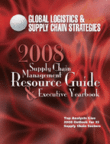
Home » Forging Ahead with Supply Chain Transformation
Forging Ahead with Supply Chain Transformation

January 17, 2008
Analyst Insight
Given the nature of complex business requirements within the industrial manufacturing space, companies should investigate enterprise applications that are flexible enough to adapt to different company business requirements through usage of service-oriented architecture. Master data management should also be looked at carefully.
-Nari Viswanathan, research director at AberdeenGroup
Aberdeen research finds that the industrial equipment manufacturing sector is characterized by a cyclical process of high product demand followed by lower demand. Companies in this sector therefore need a supply chain process and technology that can function well in these varying environments. This industry is also characterized by high product complexity, lower volumes and increased lead times due to globalization of the tier supplier base. The market is currently in a capacity-constrained situation due to global expansion but complacency must not prevail; supply chain transformation must continue.
The four key supply chain drivers in this industry sector are:
• Reducing order-to-delivery lead times. Ensuring that the entire process is optimized for lead times, from the dealer capturing the order at a dealership to the order being delivered to the customer.
• Customer service focus. Competition among global manufacturers is abundant, with extreme pressure on pricing. Given the critical nature of the usage of these products, customer service-in terms of building the right product at the right time and at the right price-is critical. Customer service in the spare parts category is also extremely critical due to the high margins involved.
• Optimize inventory. Many companies are still using weak approaches for improving customer service levels and deriving inventory targets, and are getting equally weak results. There needs to be a shift in focus towards leveraging multi-echelon inventory tools to drive overall inventory reductions while simultaneously maintaining customer service levels.
• Tie it all together with sales inventory operations planning. SIOP processes need to replace the siloed master production planning, master scheduling and allocation processes that exist in industrial equipment companies. The marketplace now has the tools that are able to model the configurations and their options for industrial products. A focus on SIOP will result in a holistic consideration of demand, supply and inventory to maximize profit irrespective of the business cycle the industry is in.
The Outlook
Aberdeen benchmark results show that supply chain management processes and technologies are being actively re-evaluated by industrial manufacturing companies today. A total of 69 percent of companies have delivered or been asked to deliver management recommendations on how to improve their supply chain management technology in the past 12 months. Additionally, 79 percent of companies are looking to improve their supply chain management processes. However, Aberdeen research also finds that 79 percent of the companies surveyed do not have full supply chain process automation and a common system company-wide. Only 21 percent of companies have supply chain processes that are fully automated with either different systems or common systems across their company.
RELATED CONTENT
RELATED VIDEOS
KEYWORDS Industrial Manufacturing
Subscribe to our Daily Newsletter!
Timely, incisive articles delivered directly to your inbox.
Popular Stories
-

-

Diversifying Production From China: Welcome to ‘The Great Reallocation’
-

U.S. Fleet Professionals Look Toward Sustainability to Cut Down on Rising Operating Costs
-

Next-Generation Packaging Brings Reliability and Visibility to Supply Chains
-

E-Commerce Boom: Easing Supply Chain Pressure with Omnichannel Supply Chains

2024 Supply Chain Management Resource Guide: There's Only One Way Off a Burning Platform
VIEW THE LATEST ISSUECase Studies
-
Recycled Tagging Fasteners: Small Changes Make a Big Impact
-

Enhancing High-Value Electronics Shipment Security with Tive's Real-Time Tracking
-

Moving Robots Site-to-Site
-
JLL Finds Perfect Warehouse Location, Leading to $15M Grant for Startup
-
Robots Speed Fulfillment to Help Apparel Company Scale for Growth